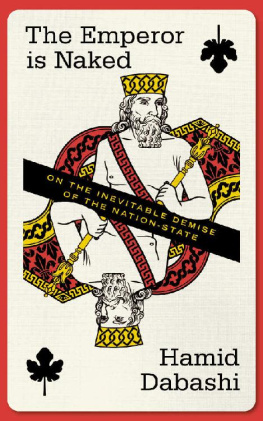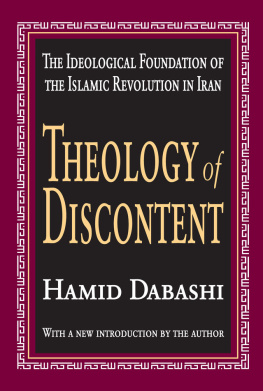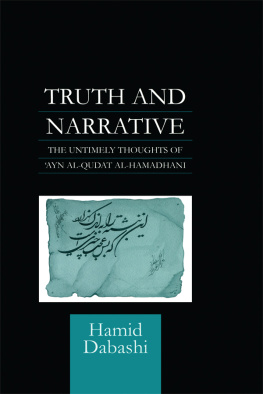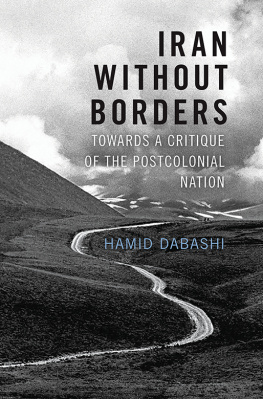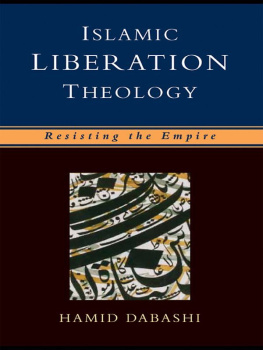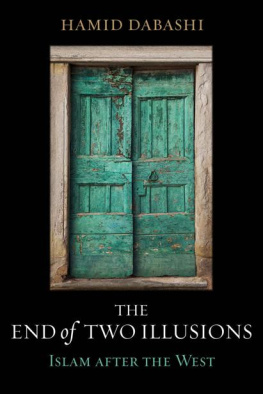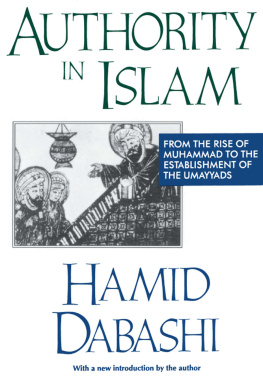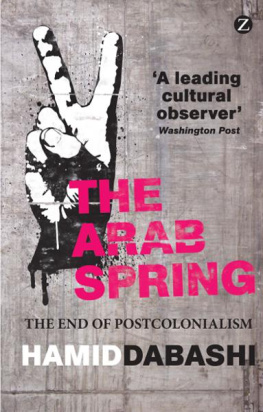Hamid Dabashi - Emperor Is Naked: On the Inevitable Demise of the Nation State
Here you can read online Hamid Dabashi - Emperor Is Naked: On the Inevitable Demise of the Nation State full text of the book (entire story) in english for free. Download pdf and epub, get meaning, cover and reviews about this ebook. year: 0, genre: Politics. Description of the work, (preface) as well as reviews are available. Best literature library LitArk.com created for fans of good reading and offers a wide selection of genres:
Romance novel
Science fiction
Adventure
Detective
Science
History
Home and family
Prose
Art
Politics
Computer
Non-fiction
Religion
Business
Children
Humor
Choose a favorite category and find really read worthwhile books. Enjoy immersion in the world of imagination, feel the emotions of the characters or learn something new for yourself, make an fascinating discovery.
- Book:Emperor Is Naked: On the Inevitable Demise of the Nation State
- Author:
- Genre:
- Year:0
- Rating:3 / 5
- Favourites:Add to favourites
- Your mark:
- 60
- 1
- 2
- 3
- 4
- 5
Emperor Is Naked: On the Inevitable Demise of the Nation State: summary, description and annotation
We offer to read an annotation, description, summary or preface (depends on what the author of the book "Emperor Is Naked: On the Inevitable Demise of the Nation State" wrote himself). If you haven't found the necessary information about the book — write in the comments, we will try to find it.
Emperor Is Naked: On the Inevitable Demise of the Nation State — read online for free the complete book (whole text) full work
Below is the text of the book, divided by pages. System saving the place of the last page read, allows you to conveniently read the book "Emperor Is Naked: On the Inevitable Demise of the Nation State" online for free, without having to search again every time where you left off. Put a bookmark, and you can go to the page where you finished reading at any time.
Font size:
Interval:
Bookmark:
ABOUT THE AUTHOR
Hamid Dabashi is the Hagop Kevorkian Professor of Iranian Studies and Comparative Literature at Columbia University in New York. Born in Iran, he received a dual Ph.D. in the sociology of culture and Islamic studies from the University of Pennsylvania, followed by a postdoctoral fellowship at Harvard University. Dabashi has written and edited many books, including Iran, the Green Movement and the USA and The Arab Spring , as well as numerous chapters, essays, articles, and book reviews. He is an internationally renowned cultural critic whose writings have been translated into numerous languages.
Dabashi has been a columnist for Aljazeera for nearly a decade and has been a regular contributor to the New York Times , CNN, the BBC, and the Egyptian Al-Ahram Weekly . He has been a committed teacher for over three decades and is also a public speaker, a current affairs essayist, a staunch antiwar activist, and the founder of Dreams of a Nation: A Palestinian Film Project. He has four children and lives in New York with his wife, the Iranian-Swedish feminist scholar, photographer, and publisher Golbarg Bashi.
The
Emperor is
Naked
ON THE INEVITABLE
DEMISE OF THE
NATION-STATE
Hamid Dabashi

The Emperor is Naked: On the Inevitable Demise of the Nation-State was first published in 2020 by Zed Books Ltd, The Foundry, Oval Way, London SE RR, UK.
www.zedbooks.net
Copyright Hamid Dabashi 2020
The right of Hamid Dabashi to be identified as the author of this work has been asserted by him in accordance with the Copyright, Designs and Patents Act, 1988 .
Typeset in Avenir and Haarlemmer by Swales & Willis Ltd, Exeter, Devon
Index by Rohan Bolton
Cover design by Alice Marwick
Cover illustration Alice Marwick
Printed and bound by CPI Group (UK) Ltd, Croydon, CR YY
All rights reserved. No part of this publication may be reproduced, stored in a retrieval system or transmitted in any form or by any means, electronic, mechanical, photocopying or otherwise, without the prior permission of Zed Books Ltd.
A catalogue record for this book is available from the British Library
ISBN -- 78699 -- hb
ISBN -- 78699 -- pb
ISBN -- 78699 -- pdf
ISBN -- 78699 -- epub
ISBN -- 78699 -- mobi

So off went the Emperor in procession under his splendid canopy. Everyone in the streets and the windows said, Oh, how fine are the Emperors new clothes! Dont they fit him to perfection? And see his long train! Nobody would confess that he couldnt see anything, for that would prove him either unfit for his position, or a fool. No costume the Emperor had worn before was ever such a complete success.
But he hasnt got anything on, a little child said.
Did you ever hear such innocent prattle? said its father. And one person whispered to another what the child had said, He hasnt anything on. A child says he hasnt anything on.
But he hasnt got anything on! the whole town cried out at last.
The Emperor shivered, for he suspected they were right. But he thought, This procession has got to go on. So he walked more proudly than ever, as his noblemen held high the train that wasnt there at all.
The Emperors New Clothes (a translation of
Hans Christian Andersens Keiserens
nye Klder by Jean Hersholt)
For
Azmi Bishara
Palestine without Borders
CONTENTS
As all other books I have published with Zed Books, this too owes its existence to the extraordinary collective that runs that beautiful publishing experience. Kim Walker, my editor for so many years, has a gentle but firm guiding hand in sustaining the central idea at the heart of the books I have written for Zed. I am grateful to her and blessed by her friendship.
The idea of this book has been with me for many years. It finally came together when I spent a sabbatical leave from Columbia at Doha Institute for Advanced Studies (DI) in Doha, Qatar. I am grateful to Azmi Bishara for the extraordinary environment of peace, comfort, and trust he has created for scores of Arab and Muslim intellectuals and countless students from around the globe. I am graced by his friendship and honored to be included among the scholars and intellectuals he has enabled to come together on the DI campus.
Ismail Nashef and Ayman El Desouky are among my dearest and closest friends on the DI campus. In them, I have found the confidence and collegiality of two leading Arab scholars, one from Palestine and the other from Egypt, in whose friendship I have rested with peace and trust.
My other friends and colleagues at DI have been equally instrumental in creating an oasis of a congenial environment that I have called my home away from home over the last few years, and where I wrote much of this book. Among these friends are Yasir Suleiman Malley, Abdelwahab El-Affendi, Abderrahim Benhaddda, Hend Al Muftah, Ibrahim Fraihat, Elizabeth Kassab, Eid Mohamed, Atef Botros, Adham Saouli, Khalil Al Anani, Raja Bahlol, Mirvat Al Rimawi, Nadine Ataya, Muna Wardam, and Hani Abou Zeid. I thank them all for the peace and serenity of the space they have made possible for me to read and write among those to whom what I think matters.
I was born and raised in Ahvaz in southern Iran at the very bosoms of a postcolonial state. The Shah of Iran, who at the time ruled over us with an iron fist, thought he was Cyrus the Great reincarnated. Cyrus sleep in peace, he declared solemnly one day upon the ancient Persian emperors grave, for we are awake! Using the majestic we assured him of the myth that his body was the body of his kingdom. Ltat, cest moi, he must have thought to himself in that moment in his impeccable French with Louis XIV on his agitated mind: The state, it is me. And the man was right. He thought he was the state. And we mortals were his mere subjects. We were sheep to him and he was our shepherd, as it were. He thought he was leading us to the Gates of the Great Civilization.
The lived experiences of my generation of Iranians embrace two monarchical dynasties and a third Islamic Republic. Ahmad Shah Qajar (reigned 1909 1925 ) was still in power when my parents were born and raised in southern Iran. They grew up to adulthood and married in Ahvaz, and my mother gave birth to my older brother Majid, may they all rest in peace, during the reign of the first Pahlavi monarch, Reza Shah (reigned 1925 1941 ), while I was born and raised during the reign of the second and last Pahlavi monarch, Mohammad Reza Shah (reigned 1941 1979 ), and I was a graduate student doing my doctoral degree at the University of Pennsylvania in Philadelphia when Ayatollah Khomeini (reigned 1979 1989 ) led the revolution that toppled the last Pahlavi monarch. In my own and my parents lifetimes, therefore, two dynasties and a subsequent Islamic Republic pretty much exhausted the binary possibilities of two versions of state formations that could follow the ravaging colonial experiences of Iran during the nineteenth century.
This, though, was not all. Soon after my birth in this postcolonial state, on June 1951 , the most traumatic event of my generation occurred when our Crowned Father, as we were told to call our king, would run away to Europe in August 1953 , fearing for his life after a vastly popular uprising led by our democratically elected Prime Minister Mohammad Mossadegh threatened his monarchy. The CIA and MI6 staged a military coup and brought him back to power. All of this was Greek to my emerging Persian, of course.
The myth of the postcolonial state and all the havoc that myth has visited upon my homeland and beyond, throughout Asia, Africa, and Latin America, dwell in our lived experiences, where the mortal lives of our monarchs and mullahs were staged and enshrined in a mythology of power and glory, while the fact of the matter was they were all entirely stripped of any such claim to legitimacy, that they were indeed naked, shorn of any shred of democratic basis to their politics. The harder these ruling regimes of power tried to manufacture a staged legitimacy for themselves, the more naked and devoid of meaning were their claims to any such democratic representations. At the height of his power in 1971 , the Shah of Iran celebrated , years of Persian monarchy, with the same pomp and ceremony that the mullarchy that succeeded him staged Shia martyrology to manufacture consent to their equally illegitimate rule. One appealed to Cyrus the Great and the other to Prophet Muhammad, and then to his son-in-law Ali and his male descendent, particularly to the Imam Hussein. They were all delusionalmanufacturing a whole parade of imaginative operatic stage to mere shreds of historical evidence. They were all convincing themselves in power and fooled none except those who were the beneficiaries of their delusions.
Next pageFont size:
Interval:
Bookmark:
Similar books «Emperor Is Naked: On the Inevitable Demise of the Nation State»
Look at similar books to Emperor Is Naked: On the Inevitable Demise of the Nation State. We have selected literature similar in name and meaning in the hope of providing readers with more options to find new, interesting, not yet read works.
Discussion, reviews of the book Emperor Is Naked: On the Inevitable Demise of the Nation State and just readers' own opinions. Leave your comments, write what you think about the work, its meaning or the main characters. Specify what exactly you liked and what you didn't like, and why you think so.

